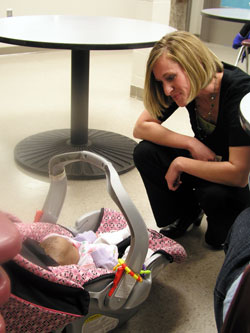Homeless shelter staff and volunteers aid families in many ways

Emily Able, the director of community and youth services at Holy Family Shelter in Indianapolis, brings a smile and caring touch to her efforts to help homeless babies and children. She works with other Holy Family Shelter staff members and volunteers to help parents that are homeless begin to build a new life of hope for their families. (Photo by John Shaughnessy)
By Mary Ann Wyand
Share God’s love.
That’s the best way for Catholics to help homeless people during a financial crisis in their lives, explained Bill Bickel, the director of Holy Family Shelter and Holy Family Transitional Housing, which are Catholic Charities ministries of the Archdiocese of Indianapolis.
The archdiocese opened the new 23-bedroom shelter for homeless families on Dec. 12, 2009. The facility shares an indoor gathering space with historic Holy Trinity Church in Indianapolis.
“Through the end of this year, we’re anticipating serving upwards of 400 homeless families, somewhere around 1,200 individuals,” Bickel said. “Of the 1,200 individuals, about 750 are children. The average age of a person living here is 9 years old. Twelve babies were born while their mothers were living at the shelter.”
The cornerstones of the shelter’s ministry are housing, social services and case management, which help families achieve structure, stability and accountability.
“We address the root causes of why the family has come here,” Bickel said. “We know that they come with enormous challenges. While housing and employment are very important, they are only two pieces of the multiple-piece puzzle of solving family homelessness. We help families work toward permanent self-sufficiency.”
Staff members rely on volunteers to help homeless parents and their children.
Parishioners and parish or school groups can help shelter residents through donations of talent and treasure, Bickel said, which range from collecting toiletries, diapers and school supplies to tutoring and serving meals.
“A group of parishioners can serve a meal or provide a birthday party,” he explained. “Volunteers can help the adults learn new life skills and prepare for job interviews.”
Volunteers are “thirsting” for opportunities to help at the shelter, Bickel added, and want to give their time and talents in meaningful ways to help people.
“The economic downturn in the past few years has changed the demographics of who we are serving,” he said, “and has galvanized faith communities to help us.”
Christina Davis, a case manager at Holy Family Shelter and Holy Family Transitional Housing, said when new families arrive at the shelter the staff members immediately begin working with them on the skills they need to accomplish their goals of acquiring employment and housing.
“Family circumstances can change very suddenly and very dramatically,” Davis said. “We teach skills to the parents that the children can model someday. We lay the groundwork and show them how to help themselves.
“We have lots of wonderful success stories,” she said. “Families come in with nothing, and leave here with opportunities and hope for the future.”
Volunteers are encouraged to serve with “a warm heart,” Davis said. “Their smile is the most welcome thing they can bring to the shelter.
“We need people to serve meals, tutor children and adults, and sort clothing donations,” she said. “Any special talent can be put to use in a classroom setting. But what’s most important is to remember that they are serving the face of Christ when they help each family.” †
